
llm-python
Large Language Models (LLMs) tutorials & sample scripts, ft. langchain, openai, llamaindex, gpt, chromadb & pinecone
Stars: 673
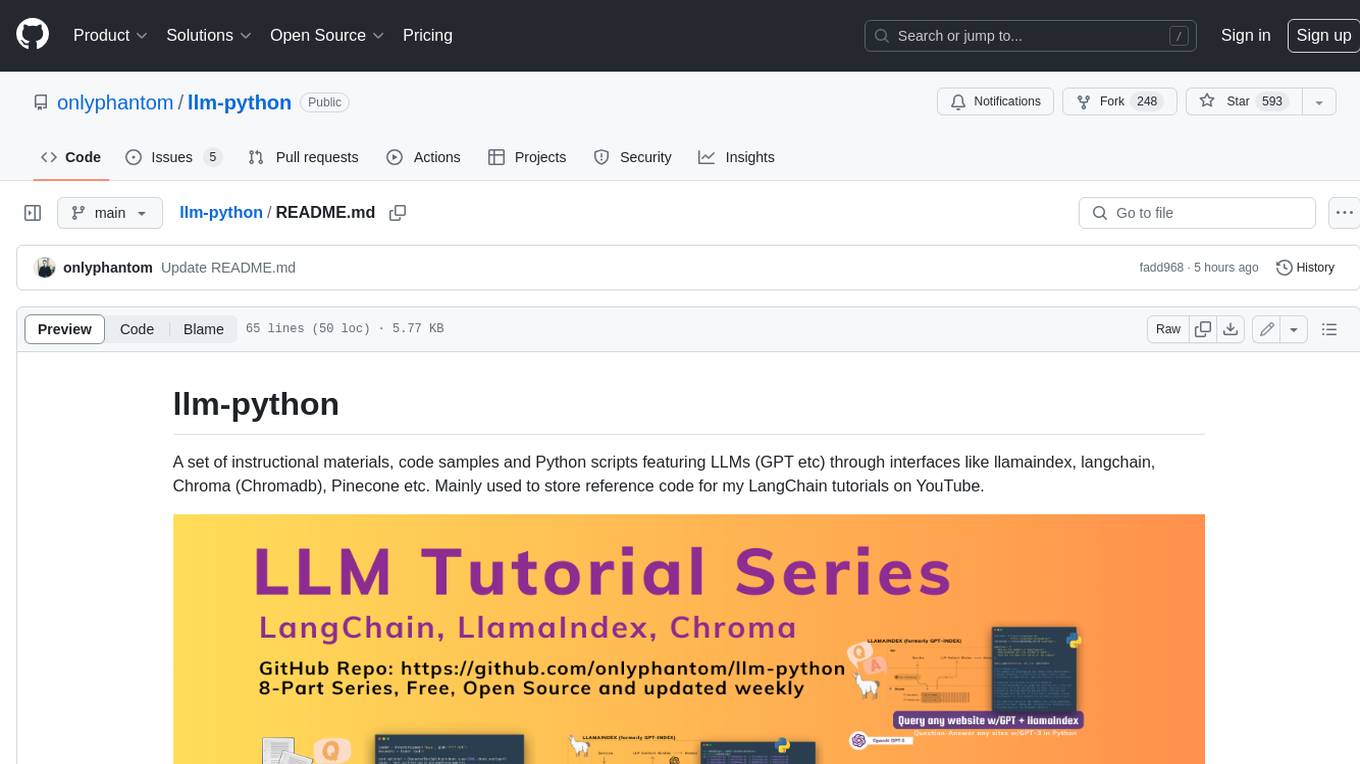
A set of instructional materials, code samples and Python scripts featuring LLMs (GPT etc) through interfaces like llamaindex, langchain, Chroma (Chromadb), Pinecone etc. Mainly used to store reference code for my LangChain tutorials on YouTube.
README:
A set of instructional materials, code samples and Python scripts featuring LLMs (GPT etc) through interfaces like llamaindex, langchain, Chroma (Chromadb), Pinecone etc. Mainly used to store reference code for my LangChain tutorials on YouTube.
Learn LangChain from my YouTube channel (~8 hours of LLM hands-on building tutorials); Each lesson is accompanied by the corresponding code in this repo and is designed to be self-contained -- while still focused on some key concepts in LLM (large language model) development and tooling.
Feel free to pick and choose your starting point based on your learning goals:
| Part | LLM Tutorial | Link | Video Duration |
|---|---|---|---|
| 1 | OpenAI tutorial and video walkthrough | Tutorial Video | 26:56 |
| 2 | LangChain + OpenAI tutorial: Building a Q&A system w/ own text data | Tutorial Video | 20:00 |
| 3 | LangChain + OpenAI to chat w/ (query) own Database / CSV | Tutorial Video | 19:30 |
| 4 | LangChain + HuggingFace's Inference API (no OpenAI credits required!) | Tutorial Video | 24:36 |
| 5 | Understanding Embeddings in LLMs | Tutorial Video | 29:22 |
| 6 | Query any website with LLamaIndex + GPT3 (ft. Chromadb, Trafilatura) | Tutorial Video | 11:11 |
| 7 | Locally-hosted, offline LLM w/LlamaIndex + OPT (open source, instruction-tuning LLM) | Tutorial Video | 32:27 |
| 8 | Building an AI Language Tutor: Pinecone + LlamaIndex + GPT-3 + BeautifulSoup | Tutorial Video | 51:08 |
| 9 | Building a queryable journal 💬 w/ OpenAI, markdown & LlamaIndex 🦙 | Tutorial Video | 40:29 |
| 10 | Making a Sci-Fi game w/ Cohere LLM + Stability.ai: Generative AI tutorial | Tutorial Video | 1:02:20 |
| 11 | GPT builds entire party invitation app from prompt (ft. SMOL Developer) | Tutorial Video | 41:33 |
| 12 | A language for LLM prompt design: Guidance | Tutorial Video | 43:15 |
| 13 | You should use LangChain's Caching! | Tutorial Video | 25:37 |
| 14 | Build Chat AI apps with Steamlit + LangChain | Tutorial Video | 32:11 |
The full lesson playlist can be found here.
- Clone this repo
- Install requirements:
pip install -r requirements.txt - Some sample data are provided to you in the
newsfoldeer, but you can use your own data by replacing the content (or adding to it) with your own text files. - Create a
.envfile which contains your OpenAI API key. You can get one from here.HUGGINGFACEHUB_API_TOKENandPINECONE_API_KEYare optional, but they are used in some of the lessons.-
Lesson 10 uses Cohere and Stability AI, both of which offers a free tier (no credit card required). You can add the respective keys as
COHERE_API_KEYandSTABILITY_API_KEYin the.envfile.
-
Lesson 10 uses Cohere and Stability AI, both of which offers a free tier (no credit card required). You can add the respective keys as
The .env file should look like this:
OPENAI_API_KEY=your_api_key_here
# optionals (not required for most of the series)
HUGGINGFACEHUB_API_TOKEN=your_api_token_here
PINECONE_API_KEY=your_api_key_here
HuggingFace and Pinecone are optional but is recommended if you want to use the Inference API and explore those models outside of the OpenAI ecosystem. This is demonstrated in Part 3 of the tutorial series.
5. Run the examples in any order you want. For example, python 6_team.py will run the website Q&A example, which uses GPT-3 to answer questions about a company and the team of people working at Supertype.ai. Watch the corresponding video to follow along each of the examples.
💡 Thanks to the work of @VanillaMacchiato, this project is updated as of 2023-06-30 to use the latest version of LlamaIndex (0.6.31) and LangChain (0.0.209). Installing the dependencies should be as simple as
pip install -r requirements.txt. If you encounter any issues, please let me know.
If you're watching the LLM video tutorials, they may have very minor differences (typically 1-2 lines of code that needs to be changed) from the code in this repo since these videos have been released with the respective versions at the time of recording (LlamaIndex 0.5.7 and LangChain 0.0.157). Please refer to the code in this repo for the latest version of the code.
I will try to keep this repo up to date with the latest version of the libraries, but if you encounter any issues, please: (1) raise a discussion through Issues or (2) volunteer a PR to update the code.
NOTE: triton package is supported only for the x86_64 architecture. If you have problems with installing it, see the triton compatibility guide. Specifically, errors like ERROR: Could not find a version that satisfies the requirement triton (from versions: none) ERROR: No matching distribution found for triton.
uname -p should give you the processor's name.
I run a mentorship program under Supertype Fellowship. The program is self-paced and free, with a community of other learners and practitioners around the world (English-speaking). You can optionally book a 1-on-1 session with my team of mentors to help you through video tutoring and code reviews.
MIT © Supertype 2024
For Tasks:
Click tags to check more tools for each tasksFor Jobs:
Alternative AI tools for llm-python
Similar Open Source Tools

llm-python
A set of instructional materials, code samples and Python scripts featuring LLMs (GPT etc) through interfaces like llamaindex, langchain, Chroma (Chromadb), Pinecone etc. Mainly used to store reference code for my LangChain tutorials on YouTube.
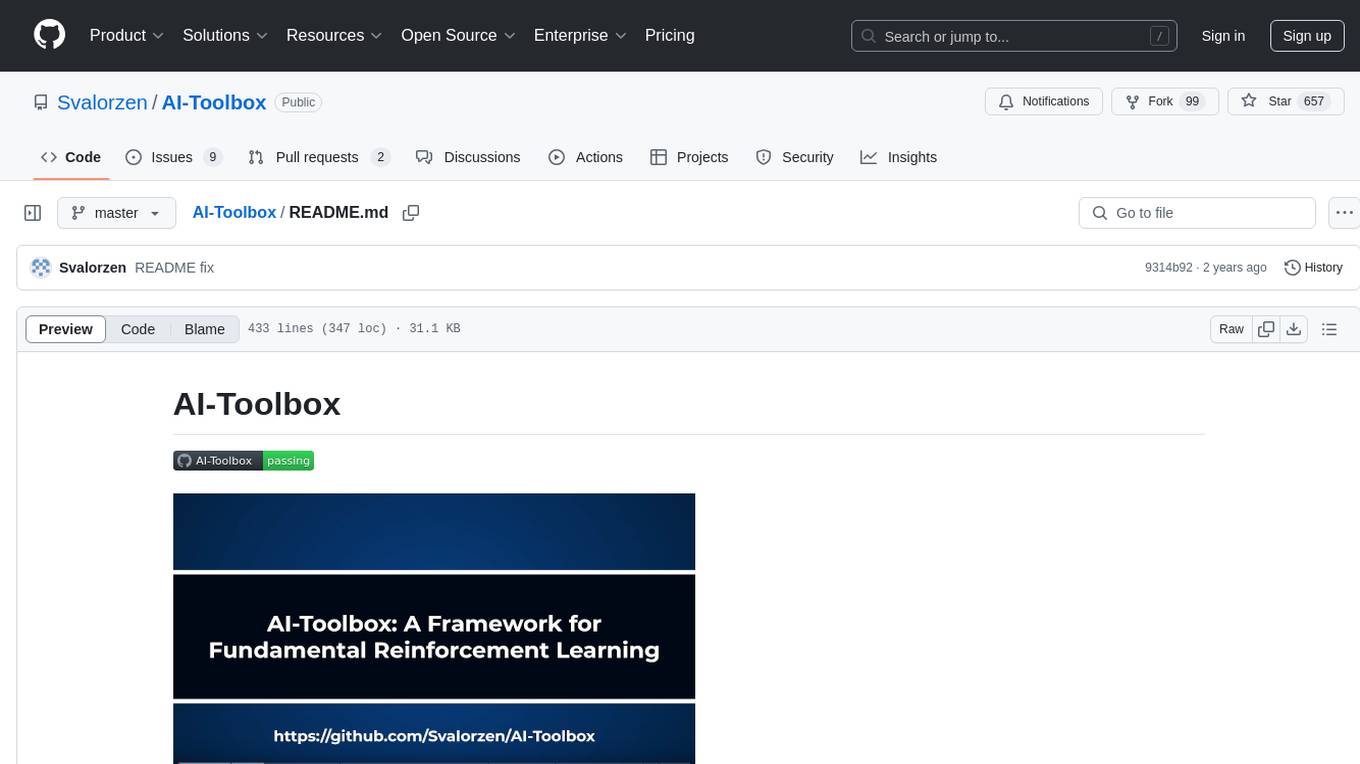
AI-Toolbox
AI-Toolbox is a C++ library aimed at representing and solving common AI problems, with a focus on MDPs, POMDPs, and related algorithms. It provides an easy-to-use interface that is extensible to many problems while maintaining readable code. The toolbox includes tutorials for beginners in reinforcement learning and offers Python bindings for seamless integration. It features utilities for combinatorics, polytopes, linear programming, sampling, distributions, statistics, belief updating, data structures, logging, seeding, and more. Additionally, it supports bandit/normal games, single agent MDP/stochastic games, single agent POMDP, and factored/joint multi-agent scenarios.
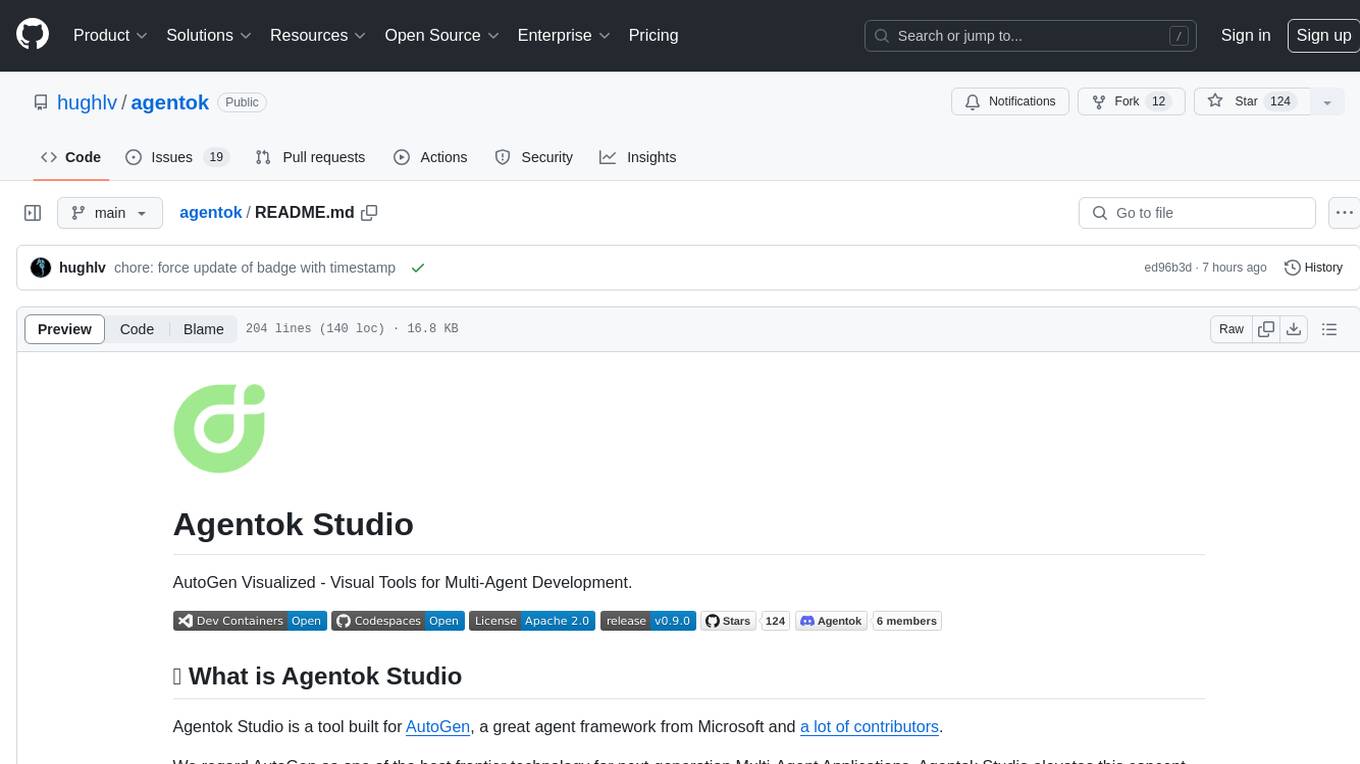
flowgen
FlowGen is a tool built for AutoGen, a great agent framework from Microsoft and a lot of contributors. It provides intuitive visual tools that streamline the construction and oversight of complex agent-based workflows, simplifying the process for creators and developers. Users can create Autoflows, chat with agents, and share flow templates. The tool is fully dockerized and supports deployment on Railway.app. Contributions to the project are welcome, and the platform uses semantic-release for versioning and releases.

floneum
Floneum is a graph editor that makes it easy to develop your own AI workflows. It uses large language models (LLMs) to run AI models locally, without any external dependencies or even a GPU. This makes it easy to use LLMs with your own data, without worrying about privacy. Floneum also has a plugin system that allows you to improve the performance of LLMs and make them work better for your specific use case. Plugins can be used in any language that supports web assembly, and they can control the output of LLMs with a process similar to JSONformer or guidance.
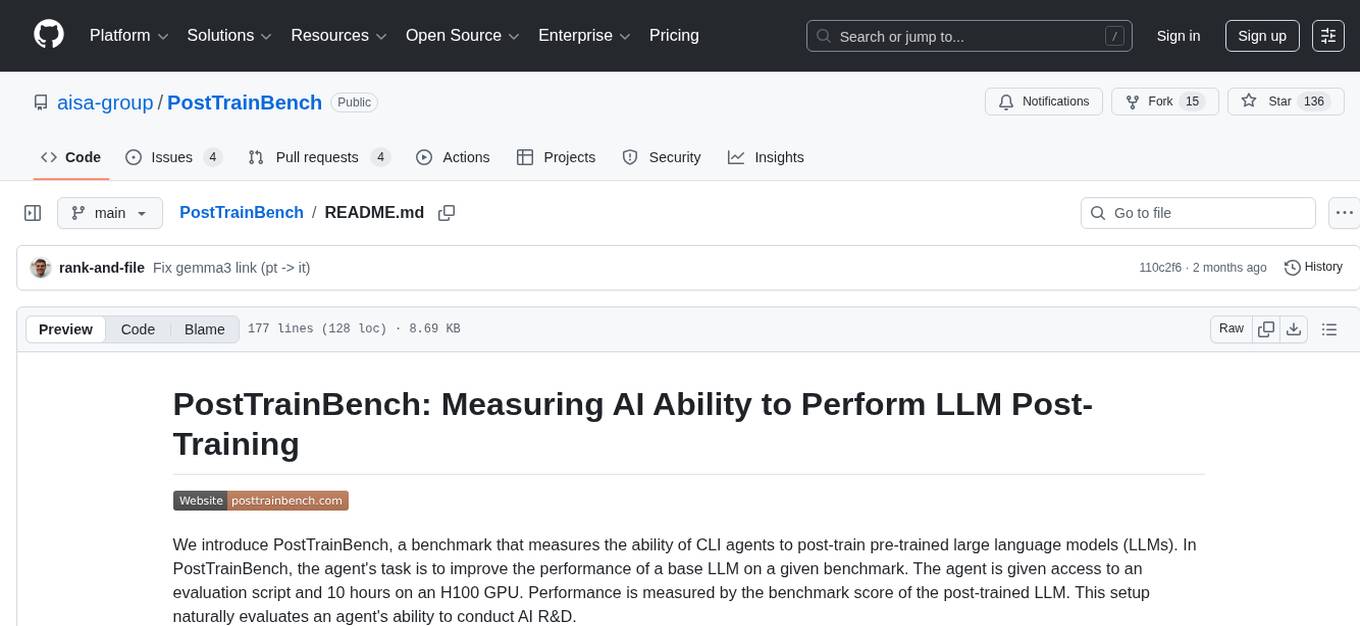
PostTrainBench
PostTrainBench is a benchmark designed to measure the ability of command-line interface (CLI) agents to post-train pre-trained large language models (LLMs). The agents are tasked with improving the performance of a base LLM on a given benchmark using an evaluation script and 10 hours on an H100 GPU. The benchmark scores are computed after post-training, and the setup evaluates an agent's capability to conduct AI research and development. The repository provides a platform for collaborative contributions to expand tasks and agent scaffolds, with the potential for co-authorship on research papers.
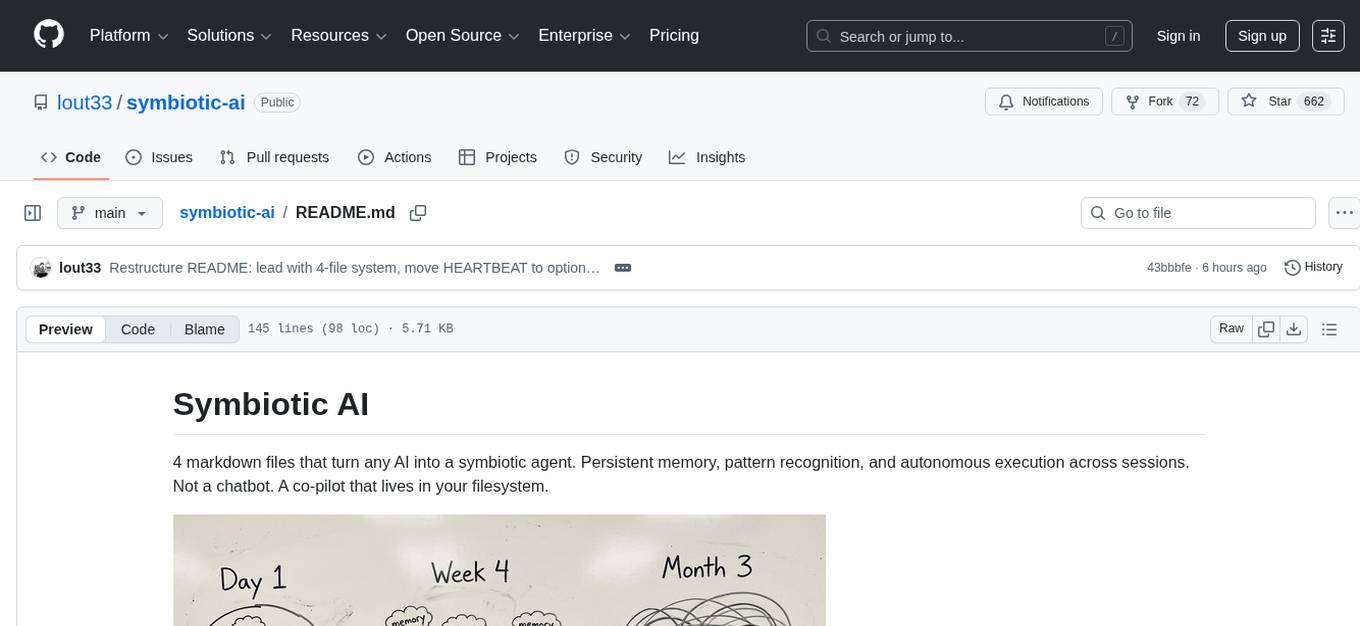
symbiotic-ai
Symbiotic AI is a tool that transforms any AI into a symbiotic agent by providing persistent memory, pattern recognition, and autonomous execution across sessions. It is not a chatbot but rather a co-pilot that resides in your filesystem. The system consists of four markdown files that define the agent's personality, user profile, agent operations, and current state. By updating these files, the agent gains insights and evolves based on real context about the user. Symbiotic AI challenges users, remembers information across sessions, takes actions such as writing code and researching, and evolves over time to provide personalized insights and advice.
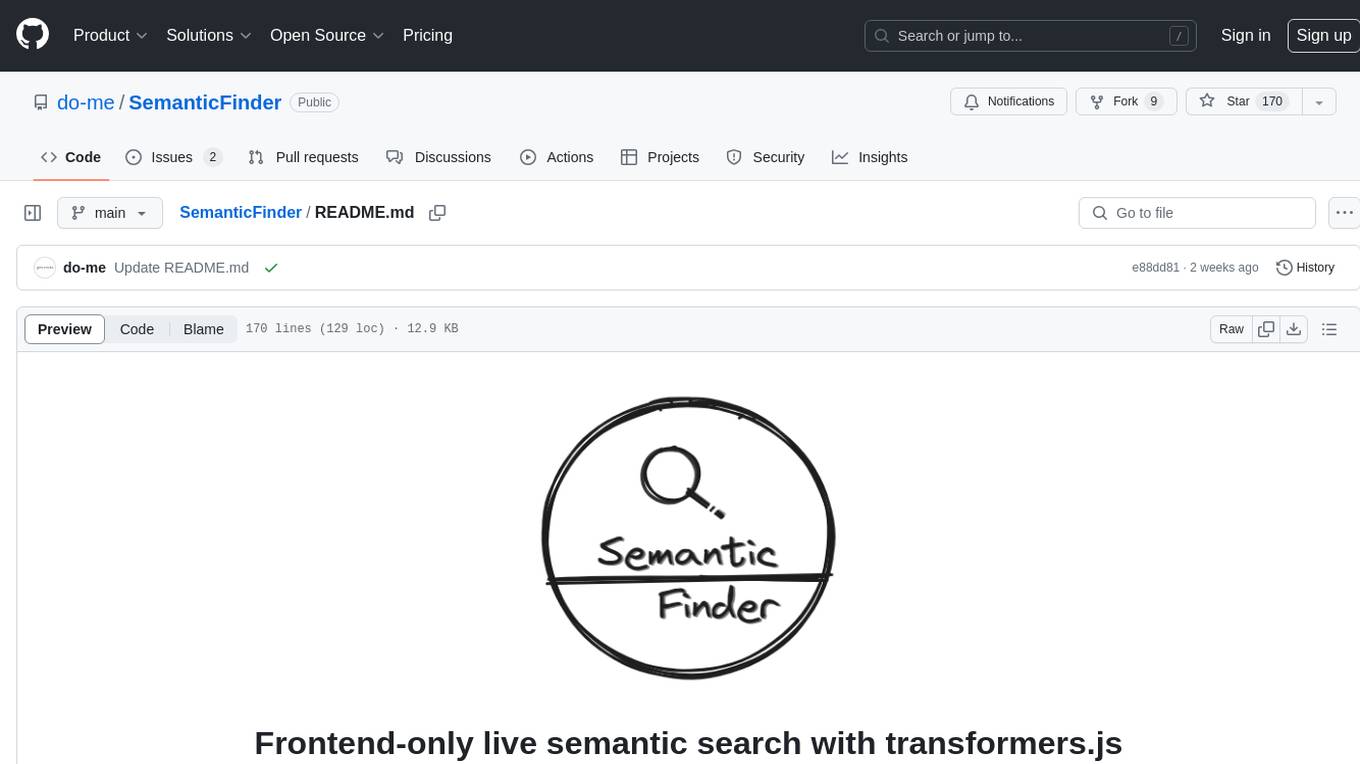
SemanticFinder
SemanticFinder is a frontend-only live semantic search tool that calculates embeddings and cosine similarity client-side using transformers.js and SOTA embedding models from Huggingface. It allows users to search through large texts like books with pre-indexed examples, customize search parameters, and offers data privacy by keeping input text in the browser. The tool can be used for basic search tasks, analyzing texts for recurring themes, and has potential integrations with various applications like wikis, chat apps, and personal history search. It also provides options for building browser extensions and future ideas for further enhancements and integrations.
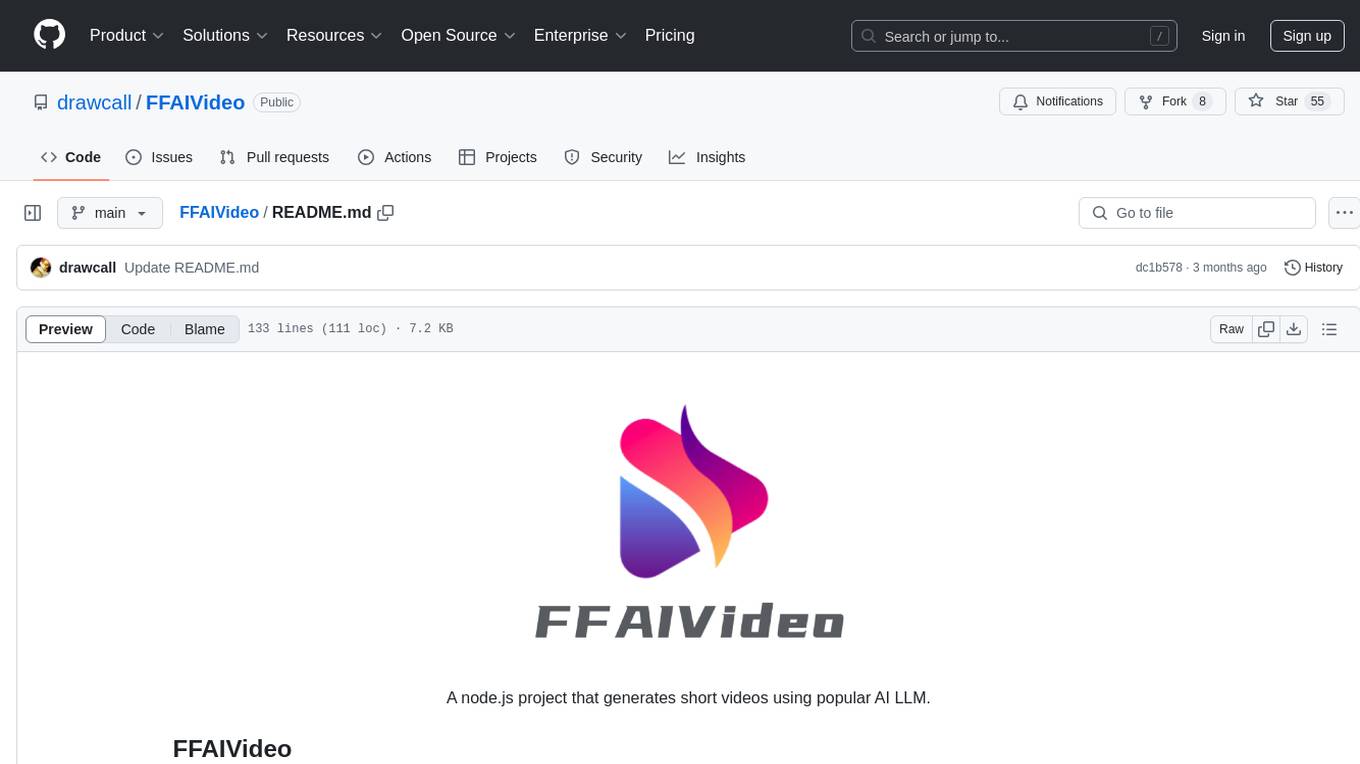
FFAIVideo
FFAIVideo is a lightweight node.js project that utilizes popular AI LLM to intelligently generate short videos. It supports multiple AI LLM models such as OpenAI, Moonshot, Azure, g4f, Google Gemini, etc. Users can input text to automatically synthesize exciting video content with subtitles, background music, and customizable settings. The project integrates Microsoft Edge's online text-to-speech service for voice options and uses Pexels website for video resources. Installation of FFmpeg is essential for smooth operation. Inspired by MoneyPrinterTurbo, MoneyPrinter, and MsEdgeTTS, FFAIVideo is designed for front-end developers with minimal dependencies and simple usage.
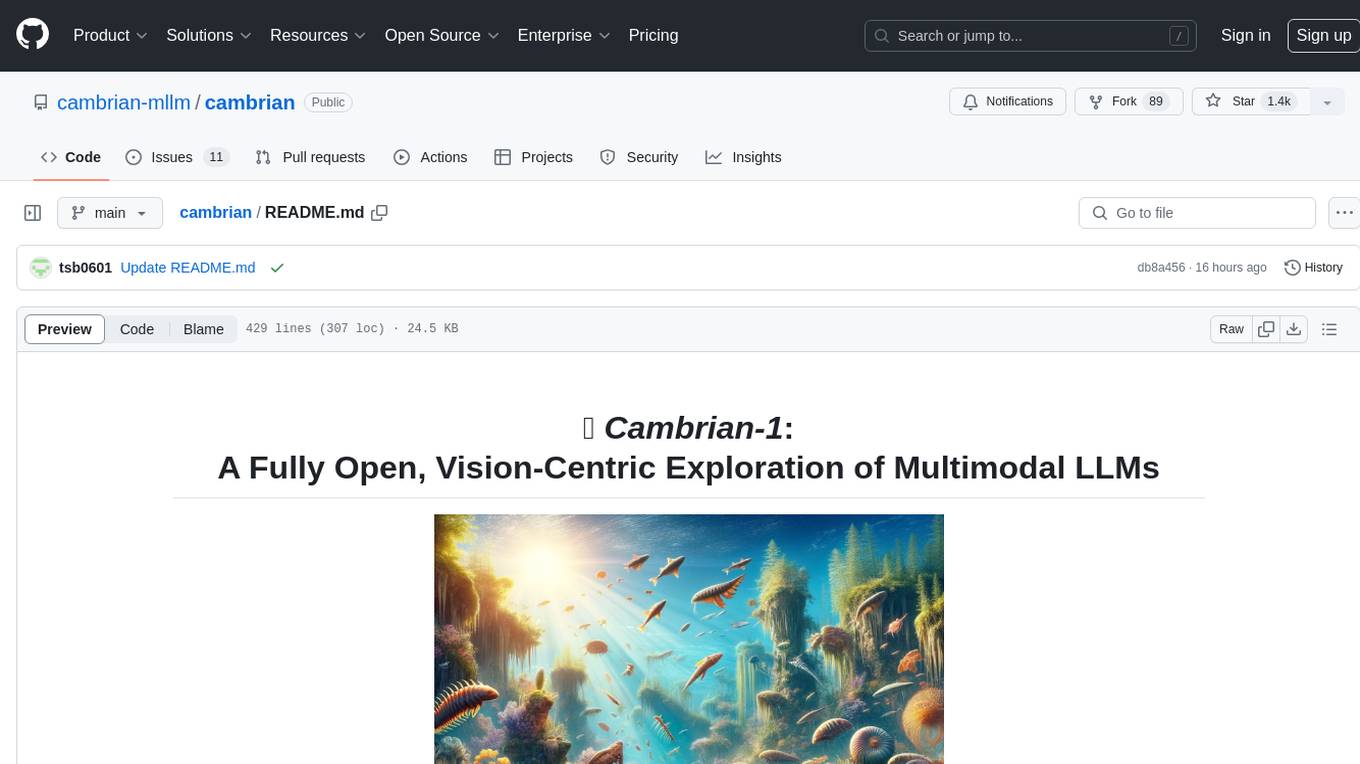
cambrian
Cambrian-1 is a fully open project focused on exploring multimodal Large Language Models (LLMs) with a vision-centric approach. It offers competitive performance across various benchmarks with models at different parameter levels. The project includes training configurations, model weights, instruction tuning data, and evaluation details. Users can interact with Cambrian-1 through a Gradio web interface for inference. The project is inspired by LLaVA and incorporates contributions from Vicuna, LLaMA, and Yi. Cambrian-1 is licensed under Apache 2.0 and utilizes datasets and checkpoints subject to their respective original licenses.

Hands-On-Large-Language-Models
Hands-On Large Language Models is a repository containing code examples from the book 'The Illustrated LLM Book' by Jay Alammar and Maarten Grootendorst. The repository provides practical tools and concepts for using Large Language Models with over 250 custom-made figures. It covers topics such as language model introduction, tokens and embeddings, transformer LLMs, text classification, text clustering, prompt engineering, text generation techniques, semantic search, multimodal LLMs, text embedding models, fine-tuning representation models, and fine-tuning generation models. The examples are designed to be run on Google Colab with T4 GPU support, but can be adapted to other cloud platforms as well.
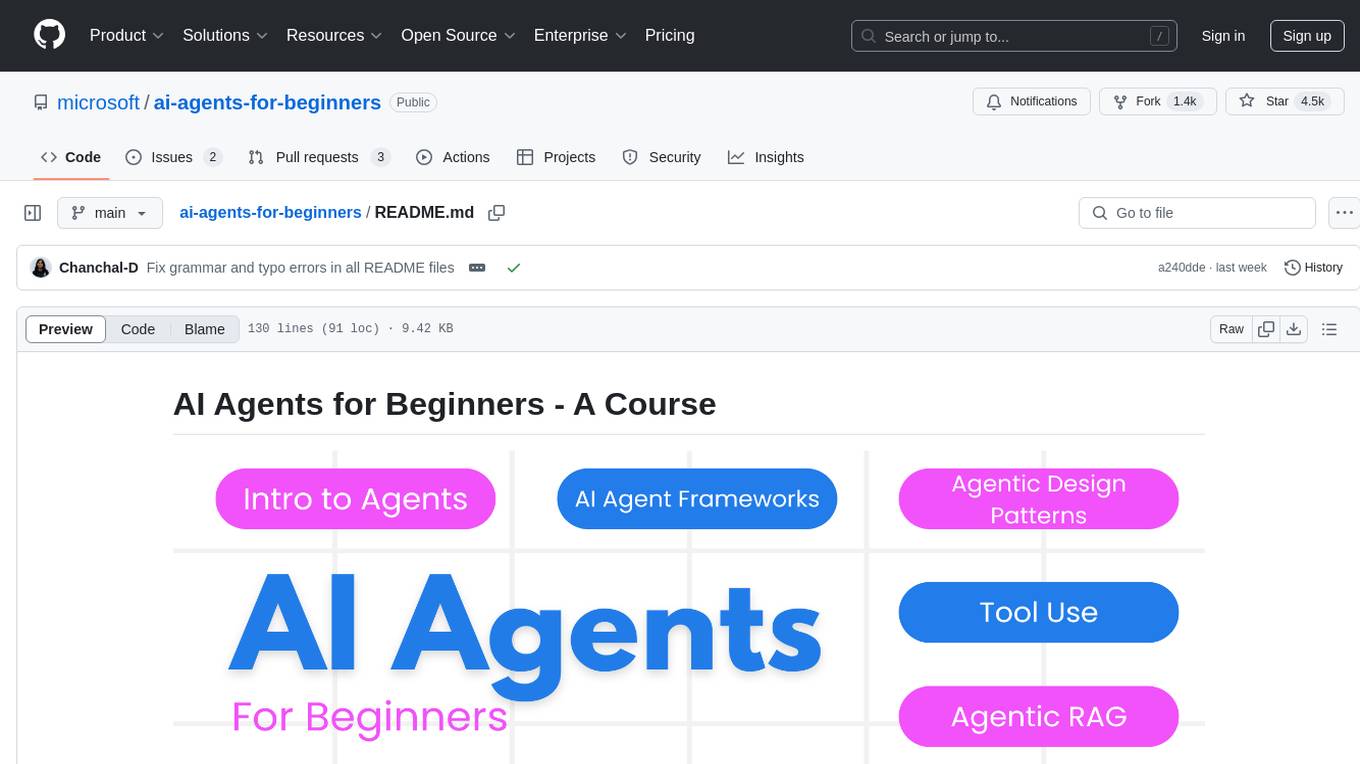
ai-agents-for-beginners
AI Agents for Beginners is a course that covers the fundamentals of building AI Agents. It consists of 10 lessons with code examples using Azure AI Foundry and GitHub Model Catalogs. The course utilizes AI Agent frameworks and services from Microsoft, such as Azure AI Agent Service, Semantic Kernel, and AutoGen. Learners can access written lessons, Python code samples, and additional learning resources for each lesson. The course encourages contributions and suggestions from the community and provides multi-language support for learners worldwide.
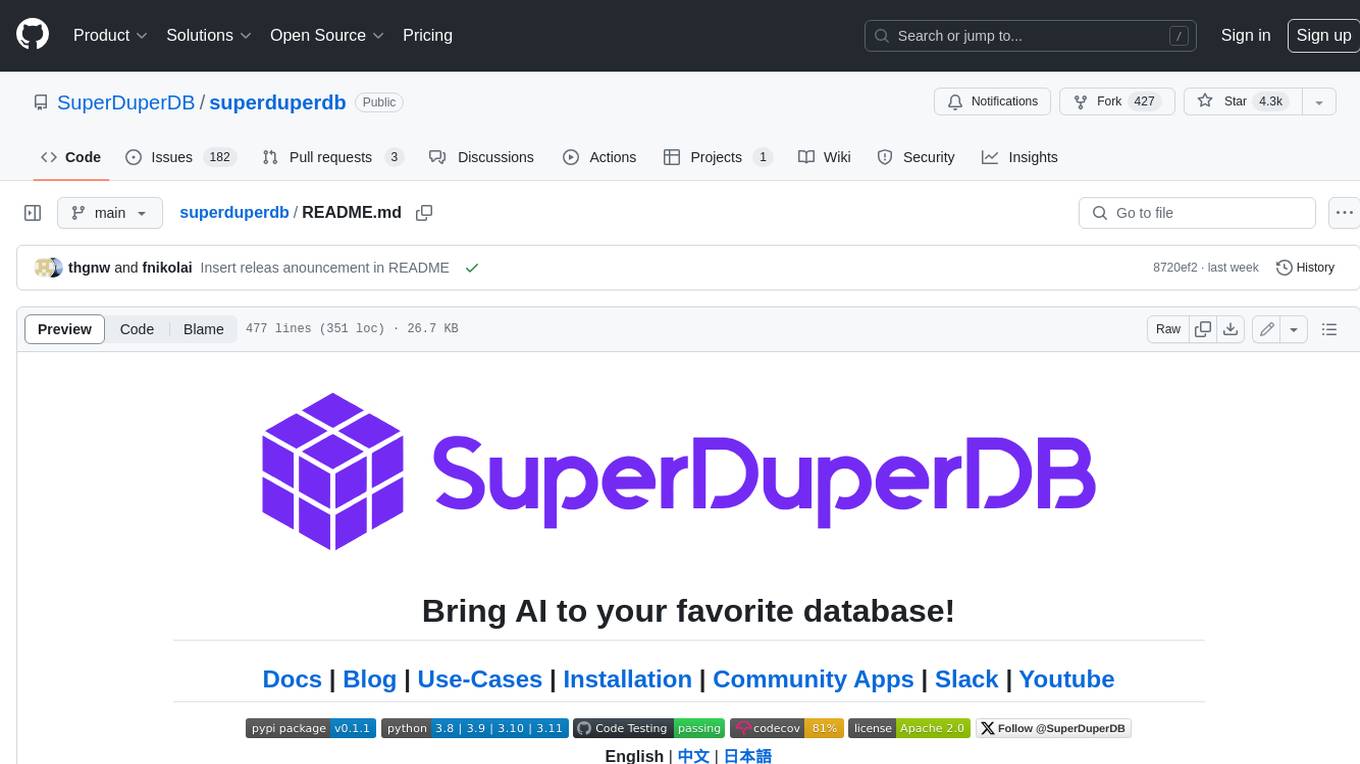
superduperdb
SuperDuperDB is a Python framework for integrating AI models, APIs, and vector search engines directly with your existing databases, including hosting of your own models, streaming inference and scalable model training/fine-tuning. Build, deploy and manage any AI application without the need for complex pipelines, infrastructure as well as specialized vector databases, and moving our data there, by integrating AI at your data's source: - Generative AI, LLMs, RAG, vector search - Standard machine learning use-cases (classification, segmentation, regression, forecasting recommendation etc.) - Custom AI use-cases involving specialized models - Even the most complex applications/workflows in which different models work together SuperDuperDB is **not** a database. Think `db = superduper(db)`: SuperDuperDB transforms your databases into an intelligent platform that allows you to leverage the full AI and Python ecosystem. A single development and deployment environment for all your AI applications in one place, fully scalable and easy to manage.
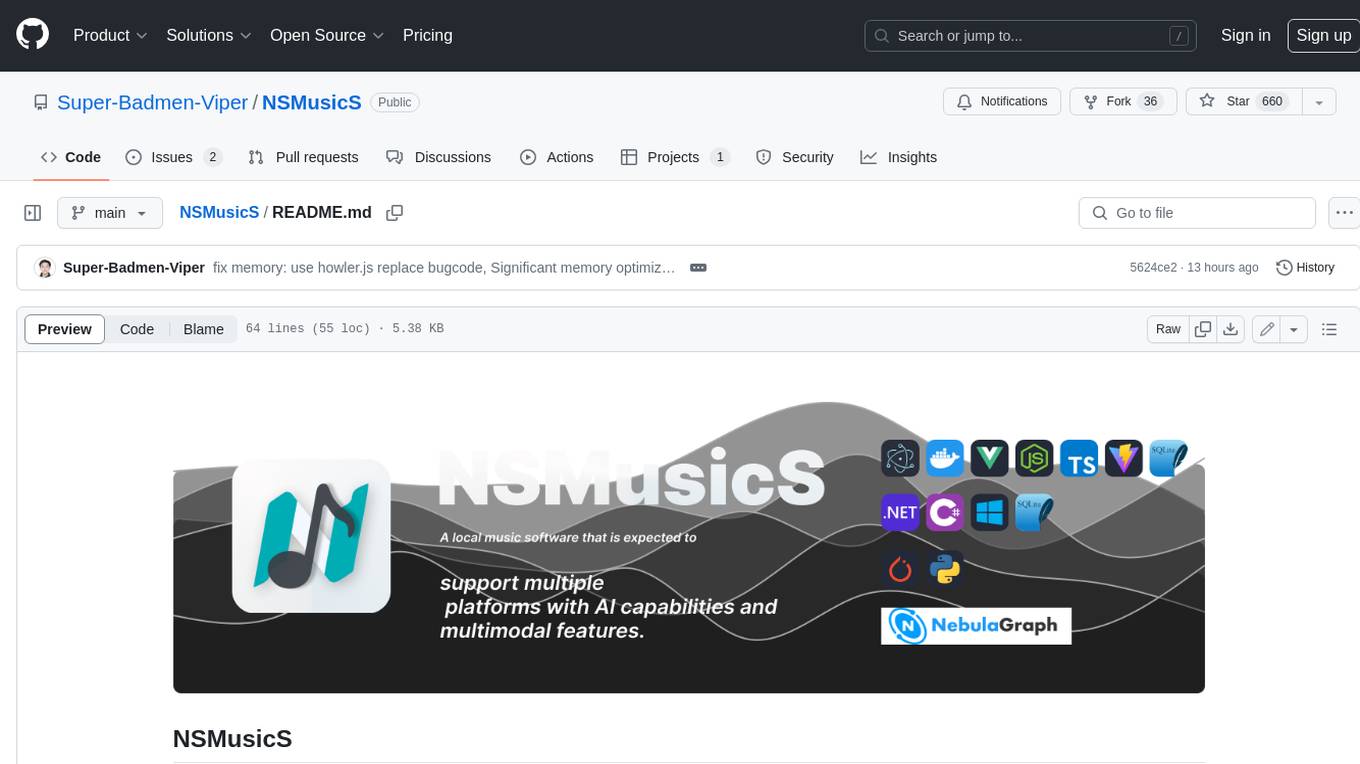
NSMusicS
NSMusicS is a local music software that is expected to support multiple platforms with AI capabilities and multimodal features. The goal of NSMusicS is to integrate various functions (such as artificial intelligence, streaming, music library management, cross platform, etc.), which can be understood as similar to Navidrome but with more features than Navidrome. It wants to become a plugin integrated application that can almost have all music functions.
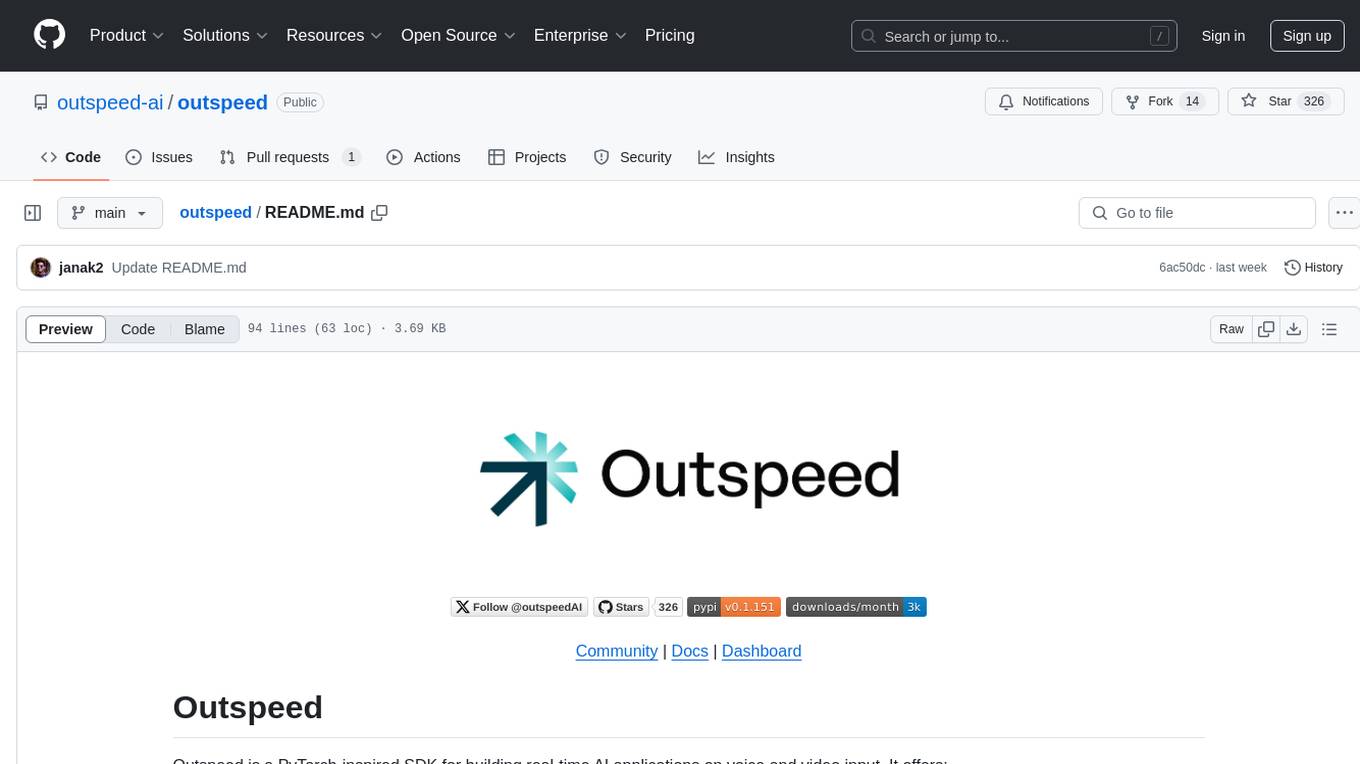
outspeed
Outspeed is a PyTorch-inspired SDK for building real-time AI applications on voice and video input. It offers low-latency processing of streaming audio and video, an intuitive API familiar to PyTorch users, flexible integration of custom AI models, and tools for data preprocessing and model deployment. Ideal for developing voice assistants, video analytics, and other real-time AI applications processing audio-visual data.
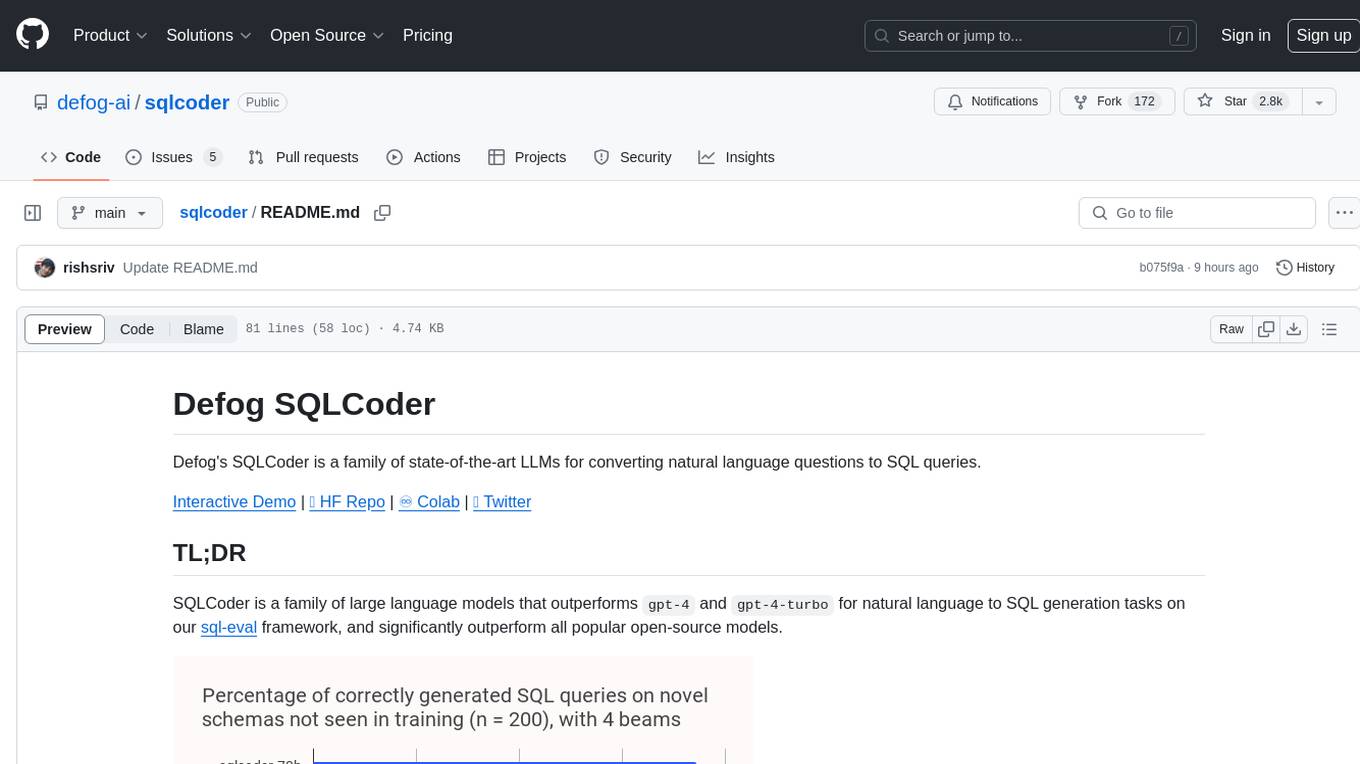
sqlcoder
Defog's SQLCoder is a family of state-of-the-art large language models (LLMs) designed for converting natural language questions into SQL queries. It outperforms popular open-source models like gpt-4 and gpt-4-turbo on SQL generation tasks. SQLCoder has been trained on more than 20,000 human-curated questions based on 10 different schemas, and the model weights are licensed under CC BY-SA 4.0. Users can interact with SQLCoder through the 'transformers' library and run queries using the 'sqlcoder launch' command in the terminal. The tool has been tested on NVIDIA GPUs with more than 16GB VRAM and Apple Silicon devices with some limitations. SQLCoder offers a demo on their website and supports quantized versions of the model for consumer GPUs with sufficient memory.

mage-ai
Mage is an open-source data pipeline tool for transforming and integrating data. It offers an easy developer experience, engineering best practices built-in, and data as a first-class citizen. Mage makes it easy to build, preview, and launch data pipelines, and provides observability and scaling capabilities. It supports data integrations, streaming pipelines, and dbt integration.
For similar tasks

llm-python
A set of instructional materials, code samples and Python scripts featuring LLMs (GPT etc) through interfaces like llamaindex, langchain, Chroma (Chromadb), Pinecone etc. Mainly used to store reference code for my LangChain tutorials on YouTube.
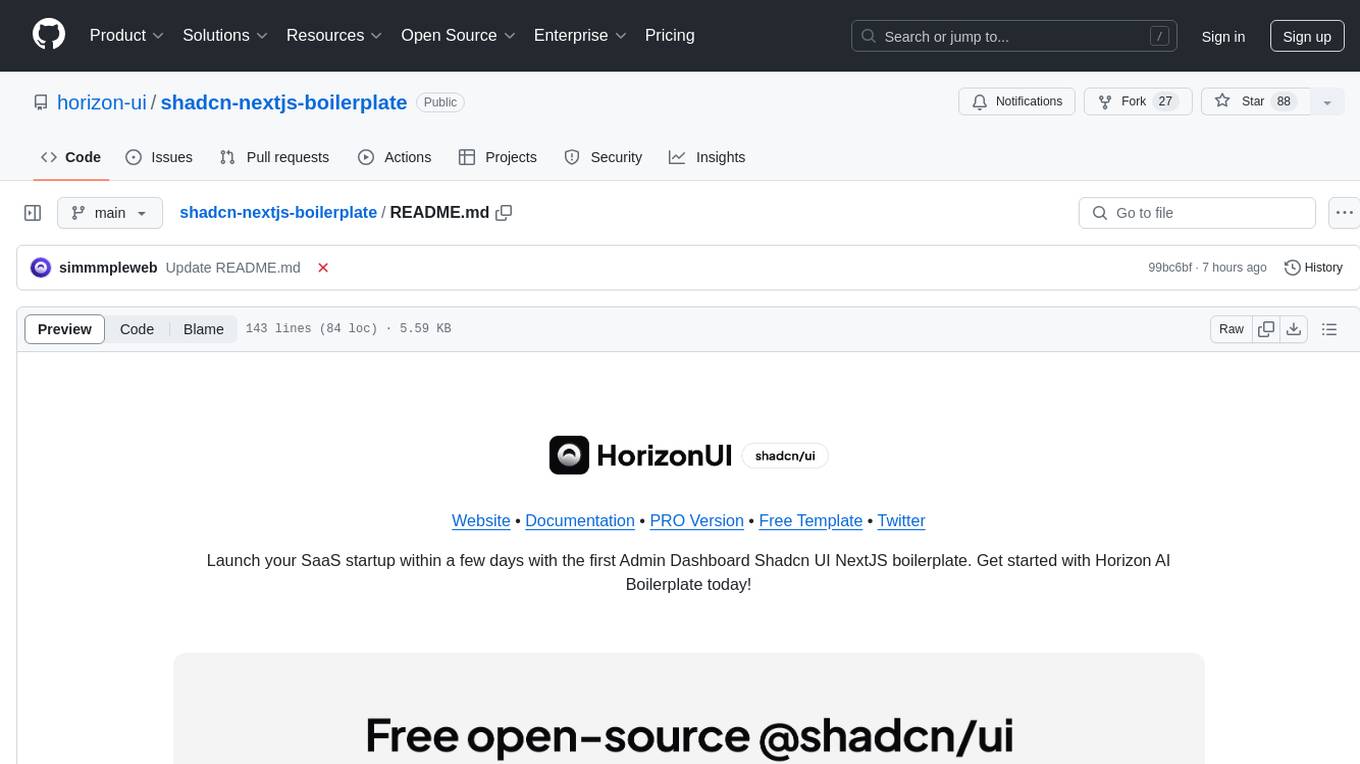
shadcn-nextjs-boilerplate
Horizon AI Boilerplate is an open-source Admin Dashboard template designed for Shadcn UI, NextJS, and Tailwind CSS. It provides over 30 dark/light frontend elements for creating Chat AI SaaS Apps quickly. The documentation is detailed and complex, guiding users through installation and usage. Users can start their local server with simple commands. The tool requires a valid OpenAI API key for ChatGPT functionality. Additionally, a Figma version is available for design purposes. The PRO version offers more components and pages. Users can report issues on GitHub and connect with the community via Discord. The tool credits open-source resources like Shadcn UI Library, NextJS Subscription Payments, and ChatBot UI by mckaywrigley.
For similar jobs

weave
Weave is a toolkit for developing Generative AI applications, built by Weights & Biases. With Weave, you can log and debug language model inputs, outputs, and traces; build rigorous, apples-to-apples evaluations for language model use cases; and organize all the information generated across the LLM workflow, from experimentation to evaluations to production. Weave aims to bring rigor, best-practices, and composability to the inherently experimental process of developing Generative AI software, without introducing cognitive overhead.

LLMStack
LLMStack is a no-code platform for building generative AI agents, workflows, and chatbots. It allows users to connect their own data, internal tools, and GPT-powered models without any coding experience. LLMStack can be deployed to the cloud or on-premise and can be accessed via HTTP API or triggered from Slack or Discord.

VisionCraft
The VisionCraft API is a free API for using over 100 different AI models. From images to sound.

kaito
Kaito is an operator that automates the AI/ML inference model deployment in a Kubernetes cluster. It manages large model files using container images, avoids tuning deployment parameters to fit GPU hardware by providing preset configurations, auto-provisions GPU nodes based on model requirements, and hosts large model images in the public Microsoft Container Registry (MCR) if the license allows. Using Kaito, the workflow of onboarding large AI inference models in Kubernetes is largely simplified.

PyRIT
PyRIT is an open access automation framework designed to empower security professionals and ML engineers to red team foundation models and their applications. It automates AI Red Teaming tasks to allow operators to focus on more complicated and time-consuming tasks and can also identify security harms such as misuse (e.g., malware generation, jailbreaking), and privacy harms (e.g., identity theft). The goal is to allow researchers to have a baseline of how well their model and entire inference pipeline is doing against different harm categories and to be able to compare that baseline to future iterations of their model. This allows them to have empirical data on how well their model is doing today, and detect any degradation of performance based on future improvements.

tabby
Tabby is a self-hosted AI coding assistant, offering an open-source and on-premises alternative to GitHub Copilot. It boasts several key features: * Self-contained, with no need for a DBMS or cloud service. * OpenAPI interface, easy to integrate with existing infrastructure (e.g Cloud IDE). * Supports consumer-grade GPUs.

spear
SPEAR (Simulator for Photorealistic Embodied AI Research) is a powerful tool for training embodied agents. It features 300 unique virtual indoor environments with 2,566 unique rooms and 17,234 unique objects that can be manipulated individually. Each environment is designed by a professional artist and features detailed geometry, photorealistic materials, and a unique floor plan and object layout. SPEAR is implemented as Unreal Engine assets and provides an OpenAI Gym interface for interacting with the environments via Python.

Magick
Magick is a groundbreaking visual AIDE (Artificial Intelligence Development Environment) for no-code data pipelines and multimodal agents. Magick can connect to other services and comes with nodes and templates well-suited for intelligent agents, chatbots, complex reasoning systems and realistic characters.
